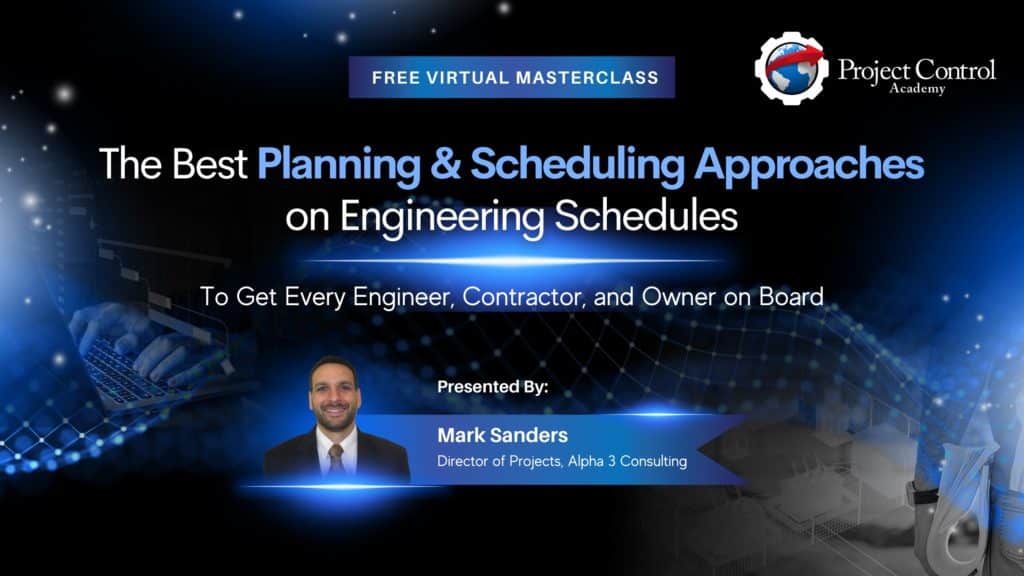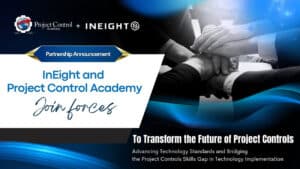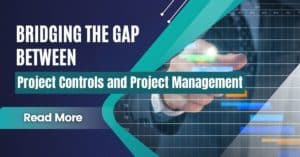How to become a world-class authority in project controls and get to the top of your field? This is the question I was eager to know the answer from someone who has already reached to the top in Project Controls and is arguably one of the leading thought leaders in Project Controls, Chris Carson.
You see his name as the author, co-author, or contributing author to various recommended practice standards and guidelines. He has presented over 500 industry sessions and authored or contributed to over 25 publications.
Chris Carson, currently serving as the Enterprise Director of Program and Project Controls for ARCADIS U.S., has won several awards for his pioneering work in project controls. He has received AACE International’s “technical excellence” and “fellow” awards, as well as the PMI College of Scheduling award for “Significant Contributions to the Scheduling Industry.” To commemorate his hard work and dedication to project controls, The International Guild of Project Controls honored Chris as the “first founding Fellow of Project Controls” with a special award in 2014. He is regarded as a world-class authority and thought-leader in the industry, and it was an honor to be able to interview him.
Chris is passionate about developing the project controls industry, sharing his knowledge, and supporting others in reaching their goals.
Here are the top ten tips, extracted from the interview with Chris Carson, for becoming a world-class authority in project controls:
1. Become Fully Engaged In The Industry Associations
Chris points out that a major milestone in his career was “the recognition of the power of the industry associations; getting involved in the associations and fully embracing that power.”
By honing in on your technical skills in project controls through studying your trade and the industry practices, you can become an expert locally. However, industry associations give you the ability to present your knowledge and beliefs about project controls in public forums, with other experts in the field. This means that you can get feedback and constructive criticism from a group of other professionals who know exactly what you do. Not only can industry associations help you to grow in your career and network with other industry professionals, but they are also a fantastic support system.
2. Improve Your Analytical Skills
To become a project controls expert, it’s necessary that you know the main functions involved in the job: planning and scheduling, cost management, estimating, risk management, document controls, forensic analysis, and claims and dispute resolution. If you want to be able to do these tasks efficiently, you need to improve your analytical skills. One way to do this is to read everything, including all of the best practices documents you can get your hands on. Being an active reader can drastically improve your analytical skills because it increases your ability to focus and solve problems.
The other key to improving your analytical skills is to question everything. The more you question, the more you can learn and analyze.
3. Enhance Your Soft Skills
Most people who work in project controls have technical minds and believe that, as long as they’re good at technical work, they can succeed in project controls. However, this isn’t entirely true. As Chris says, “really it’s the soft skills that make it work.”
You need to be able to build strong interpersonal relationships and learn to balance between being an introvert and an extrovert. There are times when this can be difficult, but if you keep a thirst for learning and knowledge, it helps.
Soft skills are crucial for anyone who works in project controls because the job itself necessitates constant human interaction, as well as the ability to educate peers about project controls.
4. Diversify Your Experience In Project Controls
There are many people who have the experience needed to work in project controls and don’t even know it. Chris shared a story of a friend who worked as a Construction Manager and, when he was laid off, couldn’t find any new work. However, part of the work he did as a CM was the same as work done as a project controller- Chris even called him a “scheduling expert.” As soon as Chris’s friend branched out his job search to include project controller positions, he had found 20 jobs and received 3 offers, all of which paid better than a CM position. Now, Chris’s friend hadn’t even realized that he was qualified to work in project controls! The moral of the story here is to expand your search and never doubt your qualifications.
That being said, you can’t become a world-class authority on project controls if you aren’t familiar with multiple areas of the industry. You need to move across the disciplines on your project controls career path in order to diversify your experience in the industry. Even if you don’t enjoy scheduling, for example, make sure you work in that area to gain experience. You don’t have to like it to be good at it.
If you have a solid resume, you have more opportunities to diversify your experience. Remember that your company uses your resume to both pursue work and to choose the staff to engage in specific projects. Make sure that you keep track of all the individual tasks you do rather than just include the broad job you were assigned in your resume; this includes both your role on projects and the type of industry involved. The details matter!
Lastly, you can diversify your experience in project controls by getting a mentor. If you find someone else in your field whose work and passion for the industry inspires you, approach them and let them know that you want to take on more responsibilities and become a project controls expert. They’ll most likely be more than happy to help someone who shows determination to improve.
5. Become Certified in Project Controls
The importance of certifications can’t be stressed more. Many people begin working in the project controls industry after having a career in a completely different field. So, when started in project controls, they may not assume that certifications are that important – if certifications made no difference in the construction industry, for example, why would it be different for project controls? However, as Chris explains, “ if I get two applicants and they appear to have similar backgrounds, and one of those two applicants has a certification of some kind, I’m absolutely going to go with them.”
Certifications make a difference in the project controls industry because they show dedication to learning and growing in experience, the same way that engagement in industry associations does. Believe it or not, certifications can also make a difference on the resume of someone who has been in the project controls industry for a while. If you have worked on projects for over a decade, adding another project experience won’t make a big difference. However, if you get a certification, you’ll stand out in the crowd.
For series of training videos on Project Controls Certifications, please click here.
6. Develop A Project Controls-Oriented Culture In Your Organization
If you want to add value to your organization, you need to know how to develop a project controls-oriented culture in the workplace. Unfortunately, many companies don’t recognize how crucial project controls is to the success of their business. Oftentimes, project controllers need to be the champion for project controls to rally the company and develop a project controls-oriented culture themselves. Much of this culture is centered around scheduling, which helps the company run smoothly and ultimately gets tasks finished.
7. Don’t Focus Too Much On Project Controls Software
While the software is an incredibly helpful tool to use in project controls, Chris cautions against focusing too intently on software:
“People often tend to focus on software as if that’s going to solve the problem. The software is not that important of an issue…the real talent; the real skill that you’re developing is not your software skills.”
At the end of the day, your main goal should be to improve your own skills and abilities, not to look for new software to understand how to do your job. Software is important, but it’s not everything. If you do not understand how to develop a reasonable schedule or build an accurate estimate, the software will simply make you look bad.
Focus first on self-improvement and then on the ways that software can help – not the other way around. You need to understand how to do your discipline, provide the best services and do so efficiently. Once you have this down, you can learn a bit more about software.
Chris doesn’t have a favorite software, as he tends to learn new software and then switch between them. However, he says that an integrated package is the best type of project controls software.
8. Learn How To Bring The Bad News In A Project Tactfully
As someone working in project controls, it’s your job to inform the group when there is bad news related to the project. While it may look like everything is going well in the project to the rest of the team, you have the experience to know better if there are indeed problems in the making.
Imagination is a skill that is crucial for project controllers to possess. The ability to imagine the end results of a project, perform trend analysis and understand the implications of the visible trends helps to improve analytical skills and, if there is a dangerous trend, bring the bad news to the attention of the group tactfully. When you learn to do this, you can learn to keep the peace and assess options rationally.
There are some project controllers who can bring the bad news but don’t offer viable solutions. If you’re good at what you do, particularly at analysis, you’ll be able to come up with reasonable solutions and mitigation strategies for your team.
9. Train Your Replacement
The advice to train your replacement may seem counterintuitive, but the truth is, it’s the only way for you to advance in your career. If you can’t be replaced, then how can you expect your company to give you a promotion? Chris said it best when he said, “If nobody can replace you, you’re stuck in your job. That’s a big deal.”
To train your replacement, you need to be sure that you understand your position in and out. Your replacement needs to know how to complete a project and see it through, not just how to start it. Sit down with your replacement and talk through projects with them so they can understand your thought process. They may even learn how to do your job better than you do! And that’s great because it gives you more reason to be promoted and also ensures the future success of the company.
10. Consistently Add Value
You can only become a world-class expert in project controls if you consistently add value to both the industry and your individual company.
Most of the awards Chris has won in the project controls industry have been related to things like “significant contributions to the scheduling industry” and “significant career achievements and success.” Chris has been adding value through his groundbreaking contributions to the project controls industry for years, which has allowed him to become the expert that he is today. Additionally, he adds value to the company he works for by following all of the tips listed above. All of the suggestions to become an expert in project controls also benefit the company that you work for because it provides them with a better worker, in the end, one that adds value to their business.
If you take any of these tips from leading project controls expert, Chris Carson, you will be one step closer to being an expert in project controls yourself. Even if you feel like you have a sound footing in your career, there is always work to do. If you aren’t engaged in industry associations, now’s your chance to start!
If you don’t have certifications, whether you’ve been a project controller for a while or whether you’re a beginner, get certified in project controls to have an edge on your resume. Improve your analytical skills and your soft skills so that you can not only excel at the technical aspects of project controls work but at the interpersonal skills necessary for the job, as well. Most importantly, diversify your experience in project controls and train your replacement so that you can advance in your career with confidence and ease.
Interested in Learning more from Chris Carson?
About the Author, Shohreh Ghorbani

Shohreh is a licensed project management professional (PMP) recognized by Project Management Institute (PMI) and holds a Master of Science in Industrial Engineering.
Connect with Shohreh via Facebook, LinkedIn, Instagram, YouTube






![[Free 90-min Masterclass] The Ultimate Leadership Recipe for Project Professionals](https://www.projectcontrolacademy.com/wp-content/uploads/2024/08/4-1024x576.jpg)















